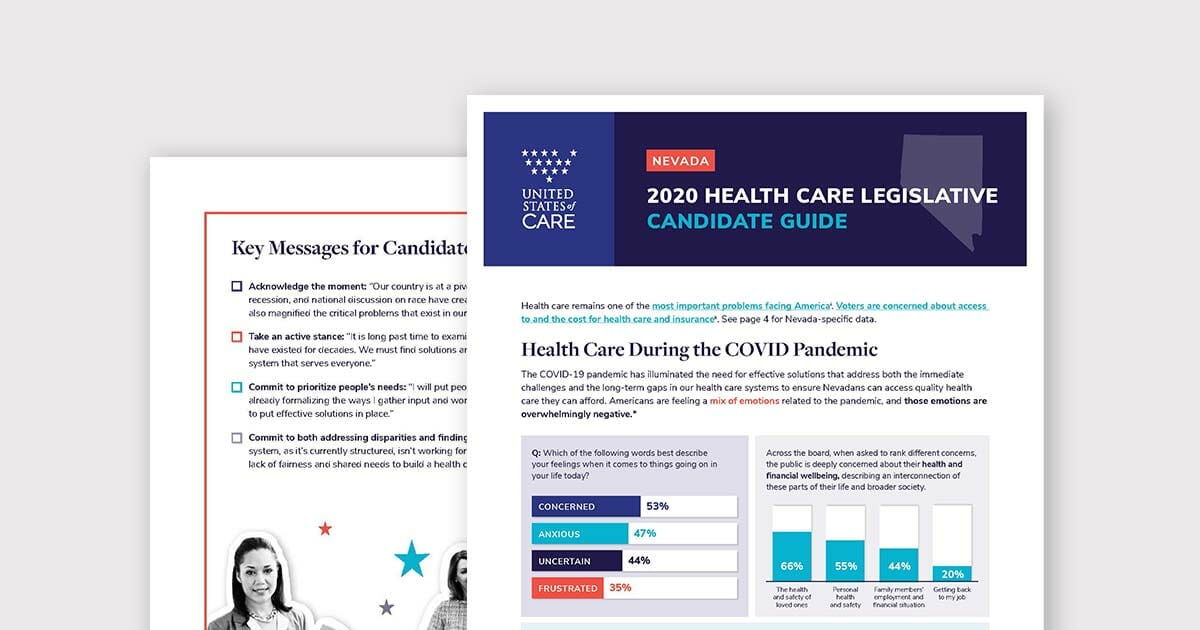Nevada, Resources, State Efforts
Nevada 2020 Health Care Legislative Guide

Health care access and cost remains one of the most important problems facing America.
- Nevada has the seventh-highest uninsured rate in the United States (11% in 2018).
- In addition, Nevada’s unemployment rate jumped from 6.9% in March to 30.1% in April on a seasonally-adjusted basis. It was 15% in June, which likely has severed tens of thousands of Nevadans from their employer sponsored insurance.
- The COVID pandemic is drastically impacting insurance coverage for Nevada — between March and May of 2020, over 42,000 people enrolled in Nevada’s Medicaid program; this is 42 times higher than enrollment between March and April of 2019.
- A disproportionate number of those infected (69% on July 1, 2020) in Nevada are Black, Indigenous, and people of color, who make up 50% of the state’s population.
- Seniors are at greatest risk. As of July 1, 2020 83% of COVID deaths in Nevada were among patients aged 60 or older.
- Access to health care has only become more challenging during the pandemic and will likely have lasting impacts on rural communities. Communities in a contiguous twelve-county region in central Nevada lack a single ICU bed, requiring rural Nevadans who get sick with COVID to drive hours to the nearest hospital, sometimes out-of-state. In March 2020, it was reported that only 8 of 20 rural ICU beds in the state were available.
- In July 2020, Governor Sisolak released a COVID-19 Fiscal Report projecting a $1.2 billion budget deficit in the Fiscal Year 2021 budget.
The COVID-19 pandemic has illuminated the need for practical solutions that address both the immediate challenges and the long-term gaps in our health care systems to ensure Nevadans can access quality health care they can afford.
Key Messages for Candidates:
- Acknowledge the moment: “Our country is at a pivotal moment. The pandemic, economic recession, and national discussion on race have created a renewed call for action. They have also magnified the critical problems that exist in our health care system.”
- Take an active stance: “It is long past time to examine our systems and address gaps that have existed for decades. We must find solutions and common ground to build a health care system that serves everyone.”
- Commit to prioritizing people’s needs: “I will put people’s health care needs first and I’m already formalizing the ways I gather input and work with community and business leaders to put effective solutions in place.”
- Commit to addressing disparities and finding common ground: “The health care system, as it’s currently structured, isn’t working for far too many. I will work to address the lack of fairness and shared needs to build a health care system that works for all of us.”
Health Care During the COVID Pandemic
The COVID-19 pandemic has illuminated the need for effective solutions that address both the immediate challenges and the long-term gaps in our health care systems to ensure people can access quality health care they can afford. In the wake of COVID, policymakers have a critical opportunity to enact solutions to meet their constituents’ short- and long-term health care needs. The 2020 Health Care Legislative Candidate Guide provides candidates with public opinion data, state-specific health care information, key messages and ideas for your health care platform.
For more information or to seek assistance, contact USofCare at Help@USofCare.org.